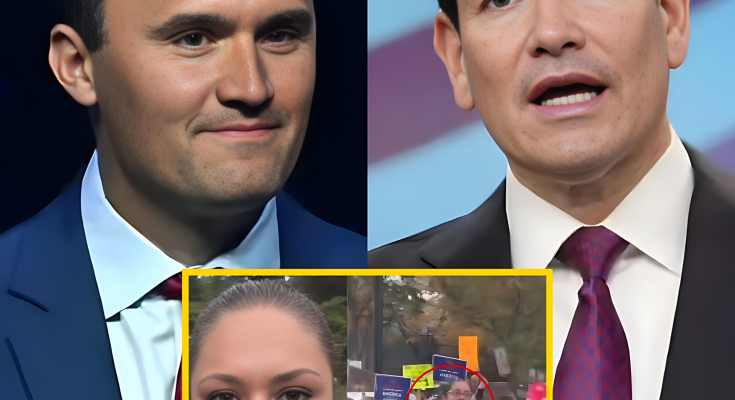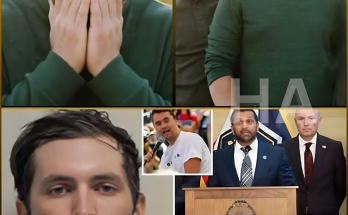The Sentence That Froze the Room: Marco Rubio Confronts Teacher Who Mocked Charlie Kirk — And Her Reaction Said It All — Even the Crowd Fell Silent. But It Was Rubio’s Expression That Sent the Internet Into a Frenzy.
No one saw it coming.
Not the crowd, not the cameras, not even the teacher who moments earlier had been laughing from her seat near the front row.
But when Senator Marco Rubio leaned forward, paused, and said six quiet words that seemed to slice through the noise of the room, everything stopped.
For the first time that afternoon, you could hear nothing — not a cough, not a shuffle, not even the hum of the air vents.
It wasn’t anger. It wasn’t rage.
It was something colder — controlled, deliberate, and unshakably certain.

A Routine Town Hall Turns Into a Moment of Shock
It began as an ordinary community forum in Tampa, Florida — one of those Q&A sessions where citizens, educators, and students come to discuss civic issues.
Rubio, known for his disciplined composure and precise language, had been fielding questions for nearly an hour. The crowd was mixed — parents, young voters, and a few outspoken educators who came prepared to challenge him.
Among them was Lisa Turner, a local elementary school teacher known for her sharp humor and occasional viral TikTok commentaries about conservative figures.
That morning, she’d made headlines again for a classroom remark mockingCharlie Kirk, the conservative activist whose recent disappearance from public life had drawn emotional reactions nationwide.
Rubio had likely heard about the comment — but no one expected him to address it publicly.
Then, as the microphone passed to Turner, the tone of the room shifted.
The Exchange That Started It All
Turner began with a laugh, asking Rubio if he thought “certain influencers should be teaching morality when their own movements are falling apart.”
The jab was obvious. A few people chuckled, a few winced. Rubio didn’t.
He simply looked at her, nodded once, and waited for the noise to fade.
Then, in a voice calm enough to be disarming, he said:
“Do you teach your students to mock people when they can’t defend themselves?”
It wasn’t loud. It wasn’t cruel.
But it was devastating.
For a moment, Turner froze — her smile faltered, her eyes darted to the side, searching for a way out of the silence that followed.
Even the moderator seemed unsure whether to continue. The crowd, sensing something deeper than a debate, stayed still.
It was the kind of silence that lives in your bones — not born of fear, but of realization.
What Rubio Did Next Changed the Tone Completely
Rubio didn’t continue.
He didn’t scold or lecture. He simply leaned back, looked at her for another second, and gave a small, almost imperceptible nod — as if to say,you already know the answer.
Then he turned back to the audience and resumed his speech as if nothing had happened.
That was the moment cameras caught the look — the faint expression of disappointment mixed with composure.
It wasn’t triumph. It wasn’t mockery.
It was the face of a man who’d just made a point without raising his voice.
Within hours, that look would ignite the internet.
The Viral Explosion
By evening, clips of the exchange flooded social platforms.
The video was simple: Rubio’s calm question, Turner’s silence, and the audience frozen in place.
No shouting. No chaos. Just six words and an expression.
The hashtag #TheSentenceThatFrozeTheRoom trended across platforms within twelve hours.
On X (formerly Twitter), users debated whether Rubio’s tone was compassionate or cutting.
On TikTok, creators dissected the moment frame by frame — analyzing the teacher’s facial reaction, Rubio’s microexpressions, and even the audience’s subtle shifts in posture.
Some called it “the most respectful takedown ever caught on camera.”
Others described it as “a masterclass in emotional intelligence.”
But there was one thing everyone agreed on: the silence was louder than any speech Rubio could have given.

The Context: Why This Moment Hit So Deep
To understand why this encounter resonated so powerfully, you have to look beyond the viral moment.
Charlie Kirk — the figure at the center of Turner’s remark — had long been a polarizing voice in the national conversation.
For his supporters, he represented fearless advocacy for free speech and youth empowerment.
For his critics, he was a provocateur who thrived on controversy.
But in the weeks before the Rubio event, Kirk had largely stepped away from public appearances. Rumors circulated — exhaustion, health issues, internal disputes — none confirmed.
When Turner mocked him, it wasn’t just a joke about a public figure; it touched something raw among those who admired him.
Rubio’s question — “Do you teach your students to mock people when they can’t defend themselves?” — reframed that mockery into a moral mirror.
It wasn’t about politics anymore. It was about empathy, responsibility, and the kind of example educators set.
Inside the Room: Eyewitness Accounts
Several attendees later described the atmosphere after Rubio’s sentence as “surreal.”
One attendee, a college student named Daniel Ruiz, said:
“You could literally feel the air change. Everyone realized something important just happened, but no one wanted to break the silence.”
Another attendee, a mother of two, described it this way:
“It wasn’t anger. It was dignity. You could tell he meant every word.”
Even some of Turner’s colleagues admitted they were stunned.
“She’s outspoken, but she’s not cruel,” one fellow teacher told a local paper. “I think she just didn’t expect to be held accountable like that — not by a senator, not in that way.”

How the Media Reacted
By the next morning, national media outlets were racing to frame the story.
Some headlines praised Rubio for his composure and moral clarity.
Others criticized him for “publicly shaming” an educator.
But the clip itself told a different story — one that didn’t fit neatly into political categories.
Commentators across the spectrum began using the moment to discuss a deeper issue:the tone of public discourse.
Had the nation’s debates become too cruel, too performative?
Was this what it took — six words from a calm senator — to remind people what civility looks like?
Even late-night shows referenced it. One comedian called it “the quietest viral moment in American politics.”
Rubio’s Office Responds
When asked about the viral clip, Rubio’s office issued a brief statement:
“Senator Rubio believes public debate should challenge ideas without demeaning people. The moment speaks for itself.”
He did not elaborate further, and perhaps that was intentional.
The lack of commentary only fueled more discussion.
Analysts suggested Rubio’s restraint was strategic — letting the public interpret the moment for themselves.
It worked. The silence became the message.

The Teacher’s Reaction
Two days after the incident, Lisa Turner released a short statement through a local education board:
“I regret that my words caused offense. My intent was to raise a question, not to belittle anyone. I respect Senator Rubio’s response and will reflect on it.”
Her response was measured — no defiance, no justification.
Some critics saw it as damage control; others saw genuine remorse.
Interestingly, within a week, her social media profiles went private, and she requested a brief leave from her school district.
No disciplinary action was taken, but sources say she requested time to “decompress from public attention.”

Why the Internet Couldn’t Let It Go
The fascination wasn’t just about politics — it was psychological.
People weren’t reacting to a political takedown; they were reacting to an emotional contrast rarely seen in public life.
In a time when debates are often loud and aggressive, the image of a calm leader confronting cruelty with composure struck a deep chord.
Social psychologists pointed out that the viral appeal of the clip came from “moral shock without aggression.”
Dr. Elaine Whitmore, a behavioral expert at Georgetown University, explained:
“What makes it powerful is that it violates expectation. People expect retaliation, not reflection. Rubio offered the latter — and it disarmed everyone.”
The Ripple Effect Across the Nation
Within days, classroom discussions across the country referenced the clip.
Some teachers used it to spark conversations about online behavior, empathy, and responsibility.
Others played it as part of civics lessons on leadership and communication.
Even schools politically opposed to Rubio acknowledged its teaching value.
One principal in Oregon said,
“It doesn’t matter which side you’re on. That’s how adults should handle confrontation — calmly, clearly, and with purpose.”
Meanwhile, conservative communities celebrated the moment as vindication — a defense of respect in an era of mockery.
How It Became a Symbol
In less than a week, the phrase “Do you teach your students to mock people when they can’t defend themselves?” appeared on t-shirts, posters, and even sermon slides in churches across the country.
Artists remixed the clip into cinematic slow-motion edits, overlaying dramatic music.
Political pages edited it into montages of classic debates and moral stand-offs.
It wasn’t about Rubio the politician anymore — it was about what he represented in that moment: the idea that restraint is strength.
Behind Closed Doors: What Insiders Say Rubio Meant
A senior staffer close to Rubio later told a journalist off record:
“It wasn’t planned. He just reacted. But that’s who he is — calm when everyone else is performing.”
Another aide described the moment as “a rare flash of humanity in politics.”
They said Rubio had grown increasingly frustrated with the tone of online discourse — and the clip, though spontaneous, “captured what he’s been trying to say for months.”
The Turning Point in Rubio’s Image
Ironically, what began as a small community event reshaped Rubio’s public image overnight.
Long known as articulate but somewhat cautious, he suddenly became the face of principled calm — a politician who didn’t need to shout to make a point.
Even rival commentators admitted the moment worked in his favor.
“It’s what authenticity looks like,” one columnist wrote. “You can’t script that kind of silence.”
A Nation Starved for Decency
In a divided culture saturated with outrage, Rubio’s quiet confrontation struck a collective nerve.
It wasn’t just what he said — it was how he said it.
No insults, no theatrics, no spin. Just a question that forced reflection.
For a brief moment, the internet — usually a battlefield — united around a single clip that felt… human.
The Final Reflection
Weeks later, the video still circulates, replayed in comment sections and think pieces.
Rubio never revisited the moment. He didn’t need to.
And somewhere in the echoes of that silence, people keep returning to one realization:
Sometimes the loudest truth is spoken softly.
“The Mask Is Falling”: Mel Gibson Shocks Hollywood by Exposing Oprah Winfrey’s Hidden Power Games — Claims Oprah’s Hollywood Empire Holds a Dark Secret No One Dares to Mention




